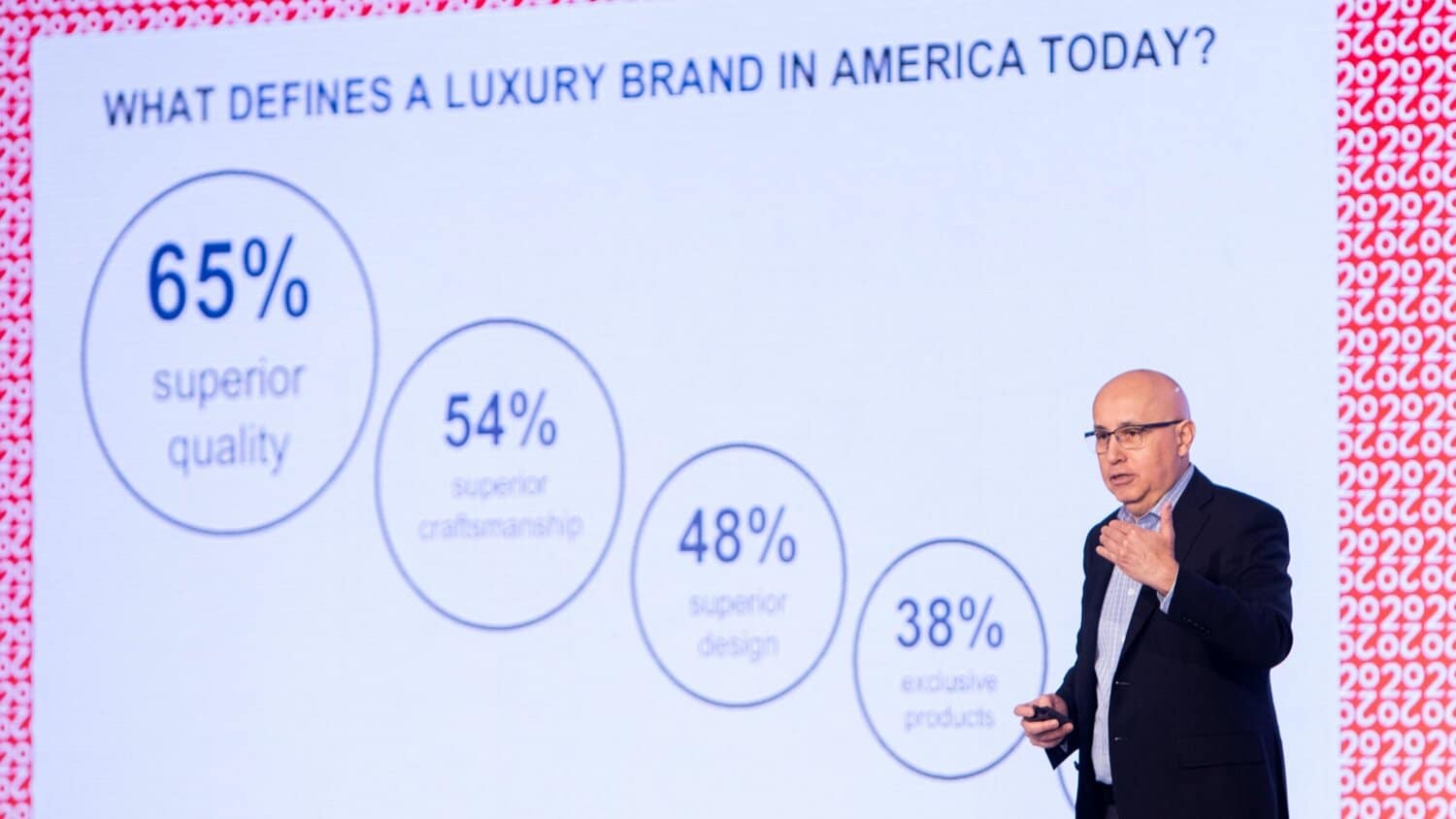[vc_row njt-role=”people-in-the-roles” njt-role-user-roles=”administrator,editor,author,armember”][vc_column][vc_column_text]
Luxury Institute conducted a survey of luxury group CEOs and came to one conclusion: most are dissatisfied with the state of resources and data analysis.
The Luxury Institute is a research, training and consulting firm on high-end products and services based in New York, and Boca Raton, Florida. Over the past 12 months, Milton Pedraza, CEO of Luxury Institute, has heard a recurring theme: most are not satisfied with the state of their group or brand’s data and analytics resources and capabilities.
Luxury Institute’s Affluent Analytics Lab (AAL) survey of luxury goods and services brand executives and their key consultants worldwide indicates that most luxury companies’ data and analytics processes are lacking.
Data collection and analysis
When asked to rate their data collection capabilities or those of the brands they lead, a majority (56%) are neutral (34%), dissatisfied (20%) or very dissatisfied (2%). In addition, most luxury brands indicate that they lack analytical expertise. Only a small minority (5%) report that the brand has staff with modern analytics training and skills, such as data science, AI and machine learning, to execute their analytics. 95% report that this critical need is partially addressed (56%) or not addressed at all (39%).
Only 8% of luxury brands report using modern analytics tools such as data visualization and powerful, self-service business intelligence tools to conduct customer analysis. An overwhelming 92% of respondents said the need is not fully met (67%) or not at all met (25%).
Thus, the study found that most companies report systemic failures in all elements of data management and analytics processes and capabilities. Luxury brands only use data for basic, rudimentary tasks such as measuring results (e.g., email campaign results or total sales) when the process could go much further and enable deeper analysis.
Without the right data management and analytics skills, and without the right processes in place, executives are expressing dissatisfaction because so far, brands are using data and its analysis to execute what amounts to mass marketing and sales in a digital format. As a result, brands are failing to innovate and create a sustainable competitive advantage. Something to improve on in the future, by implementing tools to better collect, understand and analyze data for sales purposes or to understand prospect and customer expectations.
Read also > TESLA ADDRESSES THE ISSUE OF DATA SECURITY
Featured photo : © Luxury Institute [/vc_column_text][/vc_column][/vc_row][vc_row njt-role=”not-logged-in”][vc_column][vc_column_text]
Luxury Institute conducted a survey of luxury group CEOs and came to one conclusion: most are dissatisfied with the state of resources and data analysis.
The Luxury Institute is a research, training and consulting firm on high-end products and services based in New York, and Boca Raton, Florida. Over the past 12 months, Milton Pedraza, CEO of Luxury Institute, has heard a recurring theme: most are not satisfied with the state of their group or brand’s data and analytics resources and capabilities.
Luxury Institute’s Affluent Analytics Lab (AAL) survey of luxury goods and services brand executives and their key consultants worldwide indicates that most luxury companies’ data and analytics processes are lacking.
Data collection and analysis
When asked to rate their data collection capabilities or those of the brands they lead, a majority (56%) are neutral (34%), dissatisfied (20%) or very dissatisfied (2%). In addition, most luxury brands indicate that they lack analytical expertise. Only a small minority (5%) report that the brand has staff with modern analytics training and skills, such as data science, AI and machine learning, to execute their analytics. 95% report that this critical need is partially addressed (56%) or not addressed at all (39%).
[…][/vc_column_text][vc_cta h2=”This article is reserved for subscribers.” h2_font_container=”tag:h2|font_size:16|text_align:left” h2_use_theme_fonts=”yes” h4=”Subscribe now !” h4_font_container=”tag:h2|font_size:32|text_align:left|line_height:bas” h4_use_theme_fonts=”yes” txt_align=”center” color=”black” add_button=”right” btn_title=”I SUBSCRIBE !” btn_color=”danger” btn_size=”lg” btn_align=”center” use_custom_fonts_h2=”true” use_custom_fonts_h4=”true” btn_button_block=”true” btn_custom_onclick=”true” btn_link=”url:https%3A%2F%2Ftest2023.luxus-plus.com%2Fen%2Fsubscriptions-and-newsletter-special-offer-valid-until-september-30-2020-2-2%2F”]Get unlimited access to all articles and live a new reading experience, preview contents, exclusive newsletters…
Already have an account ? Please log in.
[/vc_cta][vc_column_text]Featured photo : © Accor[/vc_column_text][/vc_column][/vc_row][vc_row njt-role=”people-in-the-roles” njt-role-user-roles=”subscriber,customer”][vc_column][vc_column_text]
Luxury Institute conducted a survey of luxury group CEOs and came to one conclusion: most are dissatisfied with the state of resources and data analysis.
The Luxury Institute is a research, training and consulting firm on high-end products and services based in New York, and Boca Raton, Florida. Over the past 12 months, Milton Pedraza, CEO of Luxury Institute, has heard a recurring theme: most are not satisfied with the state of their group or brand’s data and analytics resources and capabilities.
Luxury Institute’s Affluent Analytics Lab (AAL) survey of luxury goods and services brand executives and their key consultants worldwide indicates that most luxury companies’ data and analytics processes are lacking.
Data collection and analysis
When asked to rate their data collection capabilities or those of the brands they lead, a majority (56%) are neutral (34%), dissatisfied (20%) or very dissatisfied (2%). In addition, most luxury brands indicate that they lack analytical expertise. Only a small minority (5%) report that the brand has staff with modern analytics training and skills, such as data science, AI and machine learning, to execute their analytics. 95% report that this critical need is partially addressed (56%) or not addressed at all (39%).
[…][/vc_column_text][vc_cta h2=”This article is reserved for subscribers.” h2_font_container=”tag:h2|font_size:16|text_align:left” h2_use_theme_fonts=”yes” h4=”Subscribe now !” h4_font_container=”tag:h2|font_size:32|text_align:left|line_height:bas” h4_use_theme_fonts=”yes” txt_align=”center” color=”black” add_button=”right” btn_title=”I SUBSCRIBE !” btn_color=”danger” btn_size=”lg” btn_align=”center” use_custom_fonts_h2=”true” use_custom_fonts_h4=”true” btn_button_block=”true” btn_custom_onclick=”true” btn_link=”url:https%3A%2F%2Ftest2023.luxus-plus.com%2Fen%2Fsubscriptions-and-newsletter-special-offer-valid-until-september-30-2020-2-2%2F”]Get unlimited access to all articles and live a new reading experience, preview contents, exclusive newsletters…
Already have an account ? Please log in.
[/vc_cta][vc_column_text]Featured photo © Accor[/vc_column_text][/vc_column][/vc_row]








